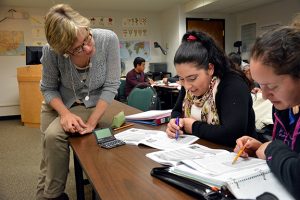In Jackson and Josephine counties, where 20 percent of residents live in poverty and more than one in 10 adults doesn’t have a high school diploma, the Rogue Community College Adult Basic Skills program helps people ages 16 to 60+ overcome obstacles to continue their education and improve their work skills.

The program itself faced a major challenge in early 2017 when state budget cuts prompted the college to cut 24 full-time positions, including seven positions in the Adult Basic Skills program that provides GED classes, English as a Second Language and other basic skills training to nearly 900 students a year.
However, a WIOA Title II grant in the amount of $316,658 has allowed the program to create three new positions and will provide some stability for the next several years. The U.S. Department of Education’s Adult Education and Family Literacy Act program, enacted as Title II of the Workforce Innovation and Opportunity Act (WIOA), designates federal funds for adult education and literacy services that serve more than 1.5 million adults nationwide each year.
At RCC, the Adult Basic Skills program serves nearly 900 students a year through learning centers at the three campuses in Grants Pass, Medford and White City as well as the Illinois Valley Learning Center in Kerby. Through the program, students can learn basic reading, writing and math skills in classes tailored for their needs with instructors who have specific training in working with adult learners. The program offers four levels of English as a Second Language instruction, three levels of Adult Basic Education/GED classes, including a Spanish GED class, as well as intensive advising, help with study skills, and partnerships with WorkSource and the state employment department.
About one-third of the Adult Basic Skills (ABS) budget is funded by grants, including local awards from the Cow Creek Umpqua Indian Foundation ($7,500), the Gordon Elwood Foundation ($10,000) and the RCC Foundation ($30,000). The WIOA Title II grant is awarded for two years and renewable for three more.
ABS students pay $65 per term, with waivers available for students who are unemployed or underemployed without basic resources. Tuition is sponsored for some students through Head Start and the Southern Oregon HOPE (SOHOPE) program.
The ABS program is primarily supported by the college budget, including $25,000 a year in tuition waivers for an innovative concurrent enrollment (CE) program that allows GED students to start college classes at the same time they’re working on their GED or adult basic skills.
“It’s just been fabulous,” said Julie Rossi, director of Adult Basic Skills. “Students don’t have to wait to get their GED and then go to college. They can get started right away.”
Through concurrent enrollment, GED students may enroll in two college courses – common prerequisites Psychology 101 and Math 63 – paired with support classes led by ABS instructors that help the students succeed by offering extra help with homework and study skills.
“We won the [RCC] president’s Innovation Award last year, in part because of concurrent enrollment,” Rossi said.
The ABS program began offering concurrent enrollment in 2015, and it’s already proving to be a great tool for student retention and completion. Since launching the concurrent enrollment option, approximately 50 percent of GED students enrolled in concurrent enrollment completed their GED in contrast to just 10 percent of GED students who were not enrolled in concurrent enrollment.
Students who participated in concurrent enrollment also were more likely to continue their studies. In the two terms after earning their GED, 42 percent of concurrent enrollment students had enrolled in college versus just 11 percent of students who completed their GED without participating in concurrent enrollment.
In Jackson and Josephine counties, where residents experience higher unemployment and lower income levels than the average Oregonian, removing barriers to education and helping students gain the skills they need to improve their own circumstances is the goal of the Adult Basic Skills program.
A student who participated in a 2016 concurrent enrollment focus group said:
“The aspect that the college was actually willing to foot the bill for it was pretty big. I’m just now coming back from years of being out of school. I didn’t get my high school diploma or anything and didn’t exactly have the best track record. I’m just getting in and finding what I need to do and they’re actually offering to give me another leg up and to get ahead and start going on the journey that I want. That’s excellent, that’s great that somebody’s willing to invest in me, in a sense. That really encouraged me to even more full-speed towards it.”
